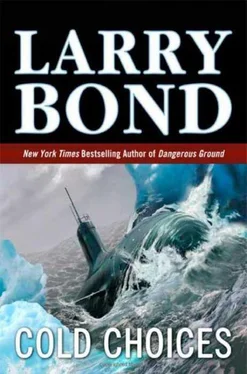There was some yaw in the motion, too, a slight turn to starboard and then back to port as the rudder lost its bite. And because the bow wasn’t a smooth, round, symmetrical shape anymore, all manner of vibrations and clunks found their way into the pattern.
Jerry had long ago ceased being seasick, if that meant losing the contents of one’s stomach. His stomach muscles were exhausted and sore, thankfully fatigued to the point where they were unable to spasm. He still felt weak and almost dizzy from the boat’s motion, but he could function— barely. He was still keeping death as a fallback option.
On Seawolf , all normal functions had been stripped down to bare bones, and then the extra bones had been discarded. Sea state six meant near gale-force winds and ten to twelve-foot seas, streaked with large tails of ice-laden spray. Submarines just weren’t built for this weather. Movement had to be carefully planned, not only through the passageways, but even simply crossing to the opposite side of a compartment. Handholds here and there, wait for the right moment to step, or risk banging your head on that cabinet, pipe, panel, or whatever as you’re thrown forward.
Shimko had passed the word as soon as they turned east. Rig the boat for heavy weather. Anything that could move, would. Anything that could be shaken loose, would move. Two thankfully minor injuries in the first six hours had shown the strength of the storm, and that the crew needed to use their imagination when securing for rough seas.
Jerry moved carefully, shuffling in concert with the deck’s gyrations in a nautical zen that came from hours of practice and a deep need to conserve energy. He, Shimko, and the captain were taking turns touring the boat, visiting each deck in every compartment, checking up on the tormented occupants. It was tiring, but necessary.
His first stop was enlisted berthing, aft and high up in the hull. The motion of the ship was, unfortunately, quite pronounced and the men literally had to wedge themselves in their bunks to prevent from being thrown out. With everyone not on watch confined to their rack, it was crowded, and noisier than usual from the motion of the ship and the sound of water and ice pounding the rubber-coated hull. Jerry was reminded of the old-style Pullman sleeper cars; assuming the train was riding a roller coaster in a hailstorm.
Many of the men were surprisingly asleep, but a few saw him, and waved or greeted him weakly. Jerry wasn’t the only one suffering the mal de mer. While only a few were as sensitive as he was, in seas like this, more than two-thirds of the crew were affected.
He noted two men in berthing that had sick chits taped to their bunks and IV bags hung over them. Dehydration was a real risk with severe seasickness. He asked to make sure the doc was looking in on them regularly.
Down lower, closer to the bottom of the boat, the torpedo room offered a smoother ride. With the boat moving so violently, all regular maintenance had been suspended, so it was quiet. The single watchstander, a pale olive hue, was seated, braced against the weapon launch console and one of the stowage racks. He was wearing his sound-powered phones and was alert enough to notice Jerry’s arrival and carefully stood.
Several other enlisted members had sought refuge there against the motion. A few were even trying to eat — cold boxed meals had been prepared by the galley. The smell of food stirred Jerry’s stomach, but he quickly left before it could wake up and remember how unhappy it was.
Aft of the torpedo room were the auxiliary machinery spaces, and then the forward reactor bulkhead. Like the torpedo room, these spaces were sparsely populated. He then climbed back up to the next deck, passing by the wardroom to radio. Actual work was being done in the radio room, as the ITs printed out message traffic and sorted it by department. With the floating wire stowed, they couldn’t monitor the fleet broadcast while on the surface; the two multipurpose antennas were still down. They’d bolted several fans, blowing as hard as they could, to cabinets and shelves to help keep the air moving. Stray bits of paper flew through the small space, but the two men on watch looked almost comfortable.
Chandler was in there as well, hunched over one corner of a table, struggling to return a binder to a storage rack filled with hefty-looking manuals. He looked pale, but focused on his task. He saw Jerry and stood, made sure the binders and manuals were secure, then stepped out into the passageway. “No change in equipment status, sir,” Chandler reported.
“I’m sure you would have told me if there was,” Jerry said coolly.
“With your permission, I’m helping the XO with a crew training summary. It’s a required report, and with most of the radio gear down I’ve got some free time, so I offered to help him with it.”
“Since you’re already doing it, I suppose you can have my permission,” replied Jerry with a touch of irritation. He was in no mood for Chandler’s brown-nosing. “I’m sure you won’t let this interfere with your regular duties, and you’ll of course keep me informed.”
“Yes, sir. Of course, sir.” He was almost standing at attention, and Jerry noted an intensity in his manner. “The XO said he might have some other things for me to do as well.”
“What about that write-up you were working on? Your account of the collision?” Jerry asked.
“I’m, I’m still working on it,” Chandler replied nervously. “The fire-control plot narratives are taking a little longer to do than I expected. There is just so much information that I need to cram into a clear, succinct report.” The commo’s cheery expression vanished as he spoke, replaced by the haunted look Jerry had seen earlier.
“I thought if I took a little break to help out the XO — you know, clear my mind a bit — it would get a little easier.” His gaze drifted downward, toward the deck, as he finished. Jerry wasn’t sure if Chandler was ashamed at getting caught jumping the chain of command again, or if he was still wrestling with the effects of the collision.
Before he could say anything, Chandler’s head whipped back up, a slight smile on his ashen face. “But I’ve finished my eval inputs for next month. They’re on your desk. Well, at least that’s where I put them.”
Genuinely surprised, Jerry said, “That’s good work, Matt. Thank you,” and then added, “As you were.” If the SOB liked formality, he’d give it to him.
Chandler disappeared back into the radio room, looking almost eager to get back to his task.
Jerry left radio glad that Chandler couldn’t see his puzzled expression. He’d never seen anyone that eager to push paper. It wasn’t natural, but it did make sense given Chandler’s cover-your-ass philosophy. He actually thought collecting all those brownie points mattered, that somehow if he got enough paperwork done, it would protect him from whatever loomed around the corner. Something must be eating at him, Jerry thought. He sure seemed to be afraid. But of what? Failure? Or not being recognized as exceptional?
Jerry got in and out of control as quickly as possible. The bridge watch was being rotated frequently, and the prebriefs and debriefs were held in control. Every watchstander came down dripping wet; some still had ice in their hair. The air was wet, a cold clammy humid feel, almost dripping, in spite of the nuclear-powered dehumidifiers. They didn’t bother putting the swab and bucket away, but two well-placed bungee cords made sure they didn’t move.
He briefly stopped to look over the navigation plot. Dunn had the duty and was carefully updating the track as he approached, one hand writing and the other locked to the edge of the table to steady himself. Dunn looked good — tired, but evidently not suffering from the sub’s motion.
Читать дальше












